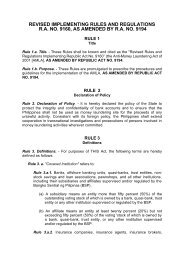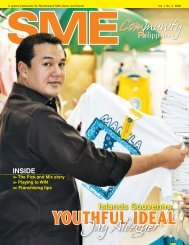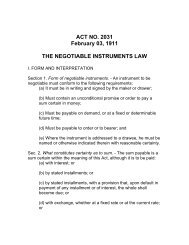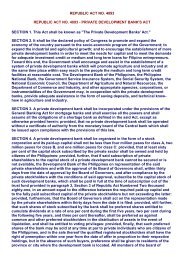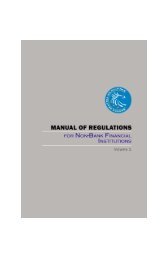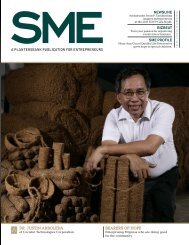Ecopreneurs - Planters Development Bank
Ecopreneurs - Planters Development Bank
Ecopreneurs - Planters Development Bank
You also want an ePaper? Increase the reach of your titles
YUMPU automatically turns print PDFs into web optimized ePapers that Google loves.
SMEs4 sme<br />
Paper or Plastic<br />
1 ton of bags = 17 trees<br />
20% get recycled<br />
Ingredients: wood, petroleum and coal<br />
Could biodegrade within a month,<br />
but—due to poor landfill design—actually decompose<br />
at about same rate as plastic<br />
Each bag leads to around 12.6 kilos of air pollution<br />
Generates five times as much solid waste as plastic<br />
Because of heft and bulk, requires more fuel getting<br />
trucked to the store<br />
1 ton of bags = 11 barrels of crude oil<br />
1% get recycled<br />
Ingredients: natural gas and petroleum<br />
Decomposes in 5 to 1,000 years<br />
Each bag results in 0.5 kilos of air pollution<br />
40% less energy to manufacture and 91% less energy<br />
to recycle than paper<br />
Up to 3% of the world’s plastic bags end up as freefloating<br />
litter, especially problematic in an archipelagic<br />
country like the Philippines<br />
Manufacturing process produces 50 times<br />
more water pollution than plastic<br />
The answer Neither<br />
Easily washes out to sea, where it clogs<br />
the stomachs of whales and turtles<br />
Skip the in-store moral dilemma and encourage customers to bring their own bags.<br />
Or, offer reusable bags made out of recycled or biodegradable materials at cost,<br />
the proceeds of which will be donated to charity<br />
(adapted from The Live Earth Global Warming Survival Handbook)<br />
Green Entrepreneur Options<br />
“Green” shouldn’t mean “antibusiness”. It means the planet needs a sustainable alternative.<br />
Such alternatives mean new jobs, new companies, and entire new industries—not to mention old industries waiting for reinvention.<br />
26<br />
SME COMmunity PHilippines<br />
Back to the Land. There’s a premium market for coffee, fruit,<br />
root crops, honey, vegetables, fish and poultry grown safely and<br />
sustainably. Local restaurants and food processors will appreciate<br />
if you can guarantee quality produce in standard weights and labeled<br />
packaging. Your small farms can also produce compost and<br />
feed for other growers. Or leverage parts of your farm or resort<br />
property to get discounts on real estate taxes by maintaining forest<br />
or wetland preserves.<br />
Salvage, Restoration and Green Buildings. Go into the<br />
building salvage business. As old structures give way to new<br />
ones, local businesses can specialize in “deconstruction”—taking<br />
buildings apart piece by piece for salvage yards. The same crews of<br />
craftsmen can put specialized skills to work restoring or constructing<br />
new, green homes. Landscapers can expand their niche if they<br />
begin looking into design, construction and maintenance of green<br />
roofs for medium and high-rise buildings.




